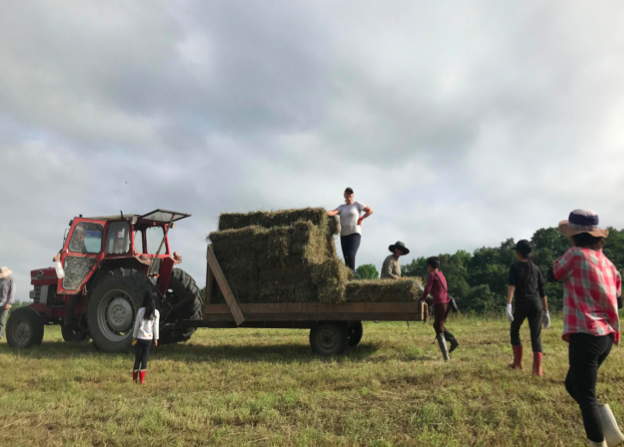By Diego Callenbach
Working on a farm across the world in Japan was truly something I had never imagined doing in my entire life prior to the second semester of my first year at Bard. Initially, my professor Nathan Shockey and advisor Yuka Suzuki had mentioned a lecture in the middle of the semester about a Japanese Biodynamic farm that was associated with Bard, and how their farming practices differed from ours. Although I couldn’t make it to the lecture, I was interested in what biodynamic meant. Towards the end of the semester the same two professors had mentioned an opportunity to apply and work at this farm called the ‘Sophia Community Farm.’ My interest was sparked by the program called WWOOF (World Wide Organization for Organic Farming) that Bard students had used in the past to organize these visits to other host farms in Japan.
My professor Nathan Shockey, had announced to our class that they were still looking for applicants for the opportunity. After applying, I quickly found out I had received the grant to pay for my plane ticket to Japan, the northern island of Hokkaido to work on the Sophia Community Farm. I had organized my two week stay with Konomi and Ben Campbell, the owners of the farm. I was able to make it a full two weeks so that I would arrive June 1 and leave June 16. Upon arriving in Hokkaido, I was grateful that Konomi could pick me up from Obihiro, a city about 40 minutes from the farm. When we drove to the farm, I was mesmerized by the Japanese landscape and the amount of farms we passed on the way to Honbetsu; a small town about 40 km from Obihiro city. Located in the Tokachi Valley, Honbetsu and many towns surrounding it were rural towns with many farms. This area of Tokachi is a well-known farming region of Hokkaido, producing many products sold on Honshu, the main island of Japan.
In my perspective, the farm was large. It contained two houses, a few greenhouses and many beds of small vegetables and it extended up a large hill called the mountain. On the other side of the hill was where the cows (Ushi) grazed and some larger vegetable plots. The open space for the cows was amazing to see, and how well they were taken care of. Since Ben grew up in Virginia, we only spoke English together. Konomi spoke perfect english, but spoke to other workers on the farm in Japanese. The one thing I wish I had done was to learn a little Japanese before my trip, but I truly did not have enough time. Each day, I became more and more familiar with the routines of milking the cows, feeding the pigs and getting ready to harvest vegetables and herbs. Not only was Sophia Farm extremely sustainable, they had such unique and structured ways of farming.
There is much more to Biodynamic farming than I had known. It did not just mean not using chemicals or pesticides or just being organic. It truly meant to treat the land in a completely different way; with respect, care and hard work. Slowly, I learned to understand their schedule. Based on Rudolf Steiner’s ideas on agriculture, Ben and Konomi were extremely passionate about setting up different preparations, and a style of composting new to me. Each day at the farm, there was a calendar that indicated the zodiac position of the stars, and which aspect of the farm would be handled that day. Some days, root vegetables were focused on, some days flower. I was the only other WWOOFer on the farm at the time, but it was made clear to me that people had been there through WWOOF many times. An extremely kind man named Satoshi worked with me everyday, showing me the ropes of everything ranging from weeding to harvesting.
Working at the farm was hard work and long days in the sun, but was extremely rewarding to see the process play out. Although the weather changed a lot on my two weeks there, I was able to get a real farm experience that was rewarding. Some mornings it reached 0º Celsius, which I thought was literally freezing for the summer time. My favorite aspect of this trip was seeing the sense of community build around this type of sustainability. On Thursdays at the farm, I was able to participate in 2 CSA (community supported agriculture) days, where portions of vegetables were distributed to families and members in Obihiro. It was amazing to see how these vegetables and produce made them incredibly happy, and helped them live a healthier lifestyle.
Overall, my time in Japan was something I will never forget, and helped me grasp a true understanding of what real farm work is like. Welcomed immediately by the host family, I felt extremely comfortable at the farm as I adjusted to the schedule. During my time there I felt like a valuable member of their biodynamic community, as I simultaneously tried to understand the different spiritual aspects of the biodynamic farming movement and Rudolf Steiner in general. I not only learned about biodynamics, but also about Japanese cuisine and culture and its distinctive qualities and traditions. I was taught how to make gyoza and many other dishes unique to Hokkaido’s produce. On my last day at the farm, we had a party as a final dinner where we made Takoyaki (an amazing ‘Osaka’ style famous dish that you must try). To say the least, I was so grateful for the wonderful hospitality and sweet goodbye that I received from Ben and Konomi. After this trip I want to investigate more about Biodynamics in the Hudson Valley and other areas of New York, and learn more about the Bard Farm and how it could be more sustainable like Sophia Community Farm.

